Final report for NEUMD17-001
Project Information
While the importance of soil for crop production has long been known, there is a growing movement to use a holistic approach to soil health that includes biological components and additional physical and chemical factors, which can increase yields and profitability while also providing water quality benefits and decreasing the volume and cost of needed inputs. Soil health received the top ranking in a 2017 needs assessment survey of Agricultural Service Providers (ASPs) and farmers (n=95).
As a continuation of the 2014-2017 Maryland “Building Soil Health” PDP project (NEUMD14-001), this project offered comprehensive education to agricultural service providers in soil health to enable them to help farmers understand the value of healthy soil and adopt the best production practices for increasing the health of farm soil. This project also incorporated demonstration trials established through a 2016 Northeast SARE partnership grant (ONE16-282c) for soil health promotion as sites for train-the-trainer education sessions. The demonstrations for the partnership grant focus on delaying termination of cover crops beyond the minimum date mandated by the Maryland cover crop incentive program, in which most grain farmers participate. This project also instructed educators in the use of a new soil health management self-evaluation tool developed through the above-mentioned partnership grant.
Maryland ASPs were invited to participate in webinars, workshops, field days, and a bus trip to Rodale Institute through email and newsletter announcements. ASPs were also invited to apply to participate at a more engaged level as a ‘core group’. Benefits of membership in this group included opportunities to help direct field trials and demonstrations on cooperating farmers’ fields and to participate in in-depth trainings aimed at improving their capacities to teach farmers.
Farmers participated in some of the field-based workshops, as recruited by the ASPs assisting with workshop coordination.
The coordinator of this project, Nevin Dawson, stepped down from the position of Maryland state coordinator in the third year of the project. While some milestones are incomplete, portions of the performance target have been surpassed due to the enthusiasm by participants for the subject matter.
Of the 283 agricultural service providers who participated in the project, 63 reported incorporating new adult learning and soil health principles and practices into their educational programs and advising, reaching 2,960 farmers who manage 363,685 acres. These data were collected through an end of year survey. Overall numbers are high, with several respondents each reporting 20,000 to 100,000 acres affected. This is likely a reflection of a) the relatively large field and farm sizes in Maryland (especially on the Eastern Shore) compared to most other Northeastern states, and b) the high level of interest in improving soil health in Maryland.
30 agricultural service providers (ASPs) will incorporate new adult learning and soil health principles and practices into their educational programs and advising, reaching 500 grain and vegetable farmers representing 37,500 acres. Of these, 20 ASPs will guide 100 farmers to complete a soil health management self-evaluation tool on their fields.
While the importance of soil for crop production has long been known, there is a growing movement to look beyond the basic physical and chemical properties of soil and use a holistic approach that includes biological components and additional physical and chemical factors. Good soil health building practices can increase yields and profitability while also providing water quality benefits and decreasing the volume and cost of needed inputs. The University of Maryland SARE state program conducted a 2017 online survey of 551 Agricultural Service Providers (ASPs) and farmers. Of the 95 responses, soil health received the top ranking when respondents were asked to rank their three top choices for expanded professional development opportunities in sustainable agriculture production topics. These results further justify the need for this project.
As a continuation of the 2014-2017 Maryland “Building Soil Health” PDP project, this project offered comprehensive education to agricultural service providers in soil health to enable them to help farmers understand the value of healthy soil and adopt the best production practices for increasing the health of farm soil. Project educational programs also included adult learning principles to help ensure that ASPs have the teaching tools necessary to effectively facilitate learning. This project also incorporated demonstration trials established through a 2016 Northeast SARE partnership grant (ONE16-282c) for soil health promotion as sites for train-the-trainer education sessions. The demonstrations for the partnership grant focus on delaying termination of cover crops beyond the minimum date mandated by the Maryland cover crop incentive program, in which most grain farmers participate. This project also instructed educators in the use of a new soil health management self-evaluation tool developed through the above-mentioned partnership grant.
Advisors/Cooperators
Educational approach
Educational opportunities for Year 1 included a webinar, a session at the Future Harvest/CASA conference, several workshops and field sessions, and and the development of a soil health video. The focus was cover crops and delayed termination, planting green, and fall interseeding. Soil health web pages on the UMD Extension website and a Google Group provided opportunities for participants to learn more about the project, obtain soil health resources, and interact with other participants. The adult education topic of story telling for education was also presented.
Educational opportunities for Year 2 included a Soil Health Toolkit presentation and adult education presentations on motivating adult learners, behavioral economics, and branding/marketing.
For Year 3, education activities included a field trip to Rodale Institute Experimental Farm and a soil health presentation to Northeast agricultural extension program leaders. Project activities were cut short in this year due to the PI's transition out of the SARE state coordinator role.
Milestones
550 agricultural service providers and farmers receive advertisements for the introductory webinar and an invitation to join the project as a ‘core group’ member. Core group membership will provide access to limited funding to cover costs associated with small-scale field demonstrations, support for coordination of related educational programs, and will require a commitment to attending workshops in their region and incorporating soil health into their own programs. Existing core group participants in the 2014-2017 project will be asked to indicate their interest in maintaining their membership. (Oct. 2017)
550
23
319
October 31, 2017
Completed
June 04, 2018
Several email notices were distributed to a project mailing list with 269 ag service providers and 23 farmers, and to a UMD ag extension list with about 50 members.
100 Agricultural Service Providers and any additional program participants new to the project will be invited to join a new Google Group as a forum for discussion, questions, and announcements related to Maryland soil health. (Oct. 2017)
100
8
295
October 31, 2017
Completed
September 30, 2020
The mailing list in announcement-only format includes 295 ASPs and 8 farmers. Announcements were also sent to about 190 University of Maryland faculty. The original Google Group was lost due to a reconfiguration of University of Maryland Google accounts. The educator reached out to another MD soil health project (Maryland Soil Health Initiative) to combine forces to create a discussion group with the critical mass necessary to sustain lively online discussions about soil health and related issues, but that project dissolved.
50 Agricultural Service Providers and 25 farmers register for and attend the introductory webinar taught by the project coordinator and one or more soil health experts from the advisory committee. The webinar will review basic soil health principles and practices, review the activities and outcomes of the 2014-2017 PDP project, outline this plan, and describe the opportunity to participate at a higher level by applying to join the “core group;” Webinar participants will also take live online polls during the webinar—one poll pre-webinar to assess baseline level of knowledge and confidence in soil health concepts, and another poll post-webinar to measure knowledge gained, intent to include soil health concepts in future programs, and interest in attending future in-depth education programs. (Nov. 2017)
25
50
30
November 30, 2017
Completed
July 11, 2018
The state coordinator, Nevin Dawson, hosted a webinar presenting information about the Building Soil Health project and featuring a guest speaker, Dr. Sara Hirsh. Hirsh presented the results of her recently completed doctoral research on deep soil nitrogen capture and recycling by early planted, deep-rooted cover crops. At the time, Hirsh had just accepted an offer to serve as the Somerset Co. UMD Extension Ag Educator, so the presentation served as an introduction to her and her expertise in that role as well.
Dawson gave an overview of the project, the associated soil health self-evaluation tool, and the opportunities for ag service providers to participate in the project. These opportunities include further development and outreach of the tool, and also participation in a trip to Rodale Institute to learn about their work in reducing tillage and building soil health in organic production systems.
Of the 30 attendees, there was at least one farmer, 3 extension educators, 1 non-profit staff, 1 other (non-UMD) university/college faculty, one commodity association representative, and one soil conservation district staff. Not all attendees completed the survey. Attendance was lower than proposed, but, in retrospect, 75 attendees was probably an overly ambitious goal. A video recording of the webinar is available at https://extension.umd.edu/soil-health/workshops.
15 farmers and 5 Agricultural Service Providers will attend a soil health session at the January CASA/Future Harvest conference to learn basic concepts of soil health with a focus on cover crops and delayed termination, planting green, and fall interseeding taught by one or more soil health experts from advisory committee. (Jan. 2018)
15
5
28
5
January 31, 2018
Completed
January 31, 2018
The Future Harvest CASA annual conference (Hyattsville, MD) included a “Regenerative Agriculture” track, which had 33 participants. Session topics included the advances in science and initiatives to promote carbon farming in Maryland and around the world, and farming practices that build upon the synergy between healthy soils and climate change adaptation/mitigation. In the “Grassfed: Meat and Dairy” track, Nicole Masters (Integrity Soils) spoke about reading weeds as an indicator of soil condition, and the importance of soil microbial health. Gabe Brown, an internationally renowned regenerative rancher, was a keynote speaker who addressed most of the 452 attendees on that day, recounting his successful use of cover cropping, no-till, and other soil health practices to significantly increase his farm’s profitability and sustainability. No affiliation data is available for these participants, but farmers generally comprise a majority of conference attendees with many beginning farmers and dabblers. Service providers present are often representing non-profit organizations. Dawson served on the conference planning committee and helped to plan the sessions.
50 Agricultural Service Providers (including 30 members of the core group) will attend a morning workshop on delayed cover crop termination, planting green, and fall interseeding taught by one or more soil health experts from advisory committee (followed by afternoon planning session below). (Feb. 2018)
50
2
15
February 28, 2018
Completed
January 22, 2018
The Alice Ferguson Foundation (AFF) is leading a project, Harnessing Our Underground Workforce: Putting Healthy Soils to Work for Maryland Agriculture, that in part aims to “Establish a cadre of leaders and practitioners in the healthy soils arena through identification of statewide cross-sectoral leaders who can engage in and influence policies and practices related to healthy soils in a productive and meaningful way.” As this goal closely aligns with the performance target of this state project, the partnership was natural. Dawson participated in one of two sessions that brought ASPs and some farmers together to learn about current work in soil health and discuss the best way forward.
30 members of core group will meet in an afternoon session (following educational morning session above) to develop a plan to begin use of the soil health management self-evaluation tool with farmers. (Feb. 2018)
30
February 28, 2018
Incomplete
While the meetings discussed above (Milestone 5) did include facilitated discussions, there was no time for the topic of the self-evaluation tool.
10 interested members of the core group form a committee led by the state coordinator to track usage of the self-evaluation tool and provide support to ASPs in promoting and using the tool. Existing members of the Cover Crop Initiative NESARE Partnership Grant project will be invited to join first. (Feb. 2018-Sep. 2018)
10
2
September 30, 2018
Completed
December 30, 2018
A functional pilot version of the tool is available to the public for use (http://ter.ps/SHeval). The opportunity to participate in the committee was described in several soil health presentations. Interest in participating on the committee was low, but use of the tool has been slowly spreading through website links and handouts at presentations.
50 Agricultural Service Providers and 20 farmers will attend one of four field days taught by the project coordinator and members of the advisory committee and offered in each of the four Maryland regions (tied to SARE Partnership Grant); participants will gain knowledge and confidence in delayed cover crop termination, planting green, and fall interseeding as a part of soil health improvement through witnessing successful adoption of the practice. These field days, open to all, will be immediately followed by a session specific to Ag Service Providers that will cover adult learning principles and practices, with a focus on “motivation to learn” and “brain-based teaching.” (May – Aug. 2018)
20
50
27
57
August 31, 2018
Completed
May 07, 2018
The full series of field days was not presented as planned, but 3 events were put on in partnership with other groups and organizations.
The first event (3/27/18; 25 ASPs, 11 farmers) was put on in partnership with the MD Healthy Soils Consortium, and featured a tour of Mason’s Heritage, a large-scale organic grain and vegetable operation, as well as a visit to a neighboring conventional grain farm. Soils at both were compared and contrasted using the MD Soil Health Card, a tool developed by Maryland NRCS to be used by ASPs and farmers to quickly evaluate the level of soil health in a particular field without any specialized equipment.
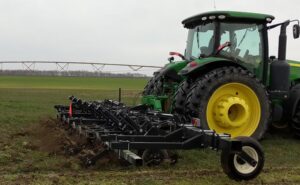
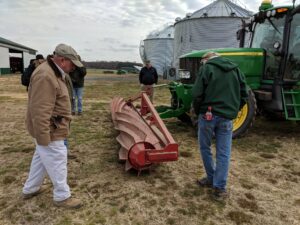
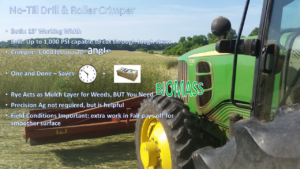
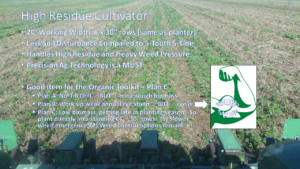
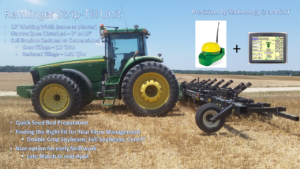
The second event (5/7/18; 24 ASPs, 6 farmers) was put on in partnership with ShoreRivers, “A clean water voice for Maryland’s Eastern Shore,” and Queen Anne’s County UMD Extension. The morning session featured a demonstration of liquid dairy manure injection (with an unintendedly spectacular show of what can happen when improper mixing leads to hose clogs and the resulting fountains of manure down the line). Attendees also participated in a tour of the host Fry family’s Fair Hill Farm, an innovative organic dairy operation. Dawson led the afternoon session, with a presentation on why soil health matters, a demonstration of the self-evaluation tool, and an invitation to use the tool with farmers. David Wilson (Penn State Extension) talked about Penn State’s Reduced-Tillage Organic Systems Experiment (ROSE) project, and his experiences in working towards the broader goal of no-till organic grain cropping.
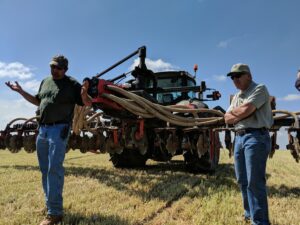
The third event (6/7/18; 8 ASPs, 10 farmers) was put on in partnership with Future Harvest CASA, a sustainable agriculture non-profit organization, and featured a tour of St. Brigid’s farm, a veal and dairy operation with rotational grazing and robotic milking. Dawson talked about soil health and demonstrated the use of the MD Soil Health card.
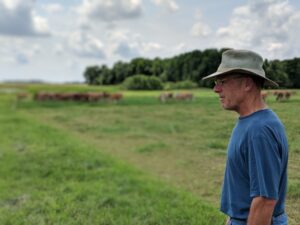
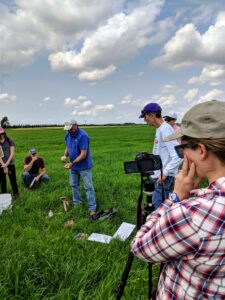
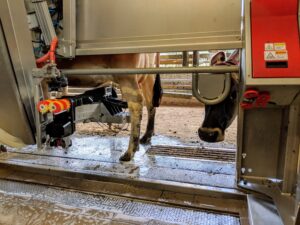
25 UMD Extension agriculture educators will attend a 20 minute soil health session at the Maryland Association of County Agriculture Agents conference to learn the importance of cover crops and delayed termination, planting green, and fall interseeding taught by one or more soil health experts from advisory committee (Jul. 2018)
25
41
July 31, 2018
Completed
June 20, 2018
Dawson presented a 30 minute session on story-telling as an educational tool to 41 UMD Agriculture Extension colleagues as part of the summer UMD ag in-service training. He included an example story about the development of his own interest in soil health and two examples showcasing successful Northeast SARE grantees in the Partnership and Farmer Grant programs.
Slide presentation: Story-Telling-for-Education-DAWSON
300 unique visitors will view soil health web pages within the UMD Extension website populated with a project description, existing soil health publications, and new project publications as they are developed, as tracked by traffic analysis program (Oct. 2017 – Sep. 2018)
300
425
September 30, 2018
Completed
September 30, 2018
Google Analytics shows a count of 425 “Users” during the project year.
550 agricultural service providers and farmers receive advertisements for a webinar that will review basic soil health principles and practices, and will introduce the online self-evaluation tool. The program will include step by step instructions and demonstrations for the tool, as well as protocols and expectations for working with farmers. (Oct. 2018)
550
October 31, 2018
Incomplete
The webinar was put on hold until the evaluation tool underwent another round of revisions. These revisions and the webinar were delayed, and then never took place due to a shift in the educator's responsibilities.
50 Agricultural Service Providers and 25 farmers register for and attend the webinar. Participants are invited orally and by email to work closely with the state coordinator in conducting outreach and training with farmers in use of the self-evaluation tool. (Nov. 2018)
25
50
November 30, 2018
Incomplete
The webinar was put on hold until the evaluation tool underwent another round of revisions. These revisions and the webinar were delayed, and then never took place due to a shift in the educator's responsibilities.
15 ASPs agree to guide 100 farmers to complete the soil health management self-evaluation tool. (Nov. 2018 – Sep. 2019)
100
15
6
23
September 30, 2019
Completed
September 30, 2020
The development of this framework was delayed and then never took place due to a shift in the educator's responsibilities. However, the tool was visited 49 times and 29 users answered one or more questions. Six of these respondents indicated that they are a farmer; the remaining 23 were presumably ASPs.
10 members of the committee identified in Year 1 will monitor usage of the tool and make updates as needed. Each of the 15 ASPs who are not members of the committee will be matched with a committee member, who will serve as a mentor and support person. Committee members and ASPs will participate in bi-monthly check-in conference calls to share progress and address issues. (Nov. 2018 – Sep. 2019)
25
September 30, 2019
Incomplete
The development of this framework was delayed and then never took place due to a shift in the educator's responsibilities.
15 farmers and 5 Agriculture Service Providers will attend a soil health session at the January CASA/Future Harvest conference to learn basic concepts of soil health with a focus on cover crop mulches, seed cocktails, and conservation crop rotations taught by one or more soil health experts from advisory committee. (Jan. 2019)
15
5
103
January 31, 2019
Completed
January 19, 2019
The conference was held on January 17-19 in College Park, MD, and hosted 619 farmers, educators, and food system workers. Session topics at the included the role of sulfur in soil health (55 participants, taught by Ray Weil, member of project advisory committee) and two sessions related to building soil health in pasture (48 participants). These were head counts conducted by the room moderators, and no breakdown by participant type is available. Conference attendees represent Virginia, West Virginia, Pennsylvania, and Delaware, with the majority coming from Maryland. The PI served on the conference committee and helped to direct the program content.
30 members of the core group will meet to learn current state of cover crop practices in Maryland and discuss opportunities for improvement. Members will also discuss the results and impacts of the Partnership Grant (project closed on 12/31/18) field demonstration sites, and then decide by consensus to either continue them at their current locations or identify some or all new sites. The decision will be based on the relative success of each demonstration site, event attendance, and the desired topic of demonstration. Related educational programming at the field demonstration sites for the following two years will be outlined. (Feb. 2019)
30
April 30, 2019
Incomplete
Field demonstration sites were not established for 2019. Field-based educational activities will focus on the work of early adopter farmers and farmers with their own test strips for innovative practices.
30 core group members will receive an invitation to apply for participation in a bus trip to Rodale Institution Experimental Farm to see and learn about the latest research in soil health in the context of organic agriculture. (Apr. 2019)
30
350
April 30, 2019
Completed
September 20, 2019
The State Coordinator spoke to Rodale Institute staff about tour and workshop options and decided against visiting the campus for the public open house in favor of a private tour and focused presentations and discussions on soil health with Institute researchers on October 21, 2019. He also described this tour opportunity during several soil health presentations (see milestone 19).
After limited response from the smaller group, an invitation to apply for a spot on the trip was distributed widely to the 350 ASPs on the project mailing list and the Maryland Soil Health Initiative mailing list.
18A. 20 core group members will be accepted as participants for bus trip to Rodale. (May 2019)
18B. 20 core group members take bus trip to Rodale. (July 2019)
20
1
7
July 31, 2019
Completed
October 21, 2019
Seven ASPs and one farmer applied and were accepted to attend the Rodale Institute bus trip. Five additional ASPs wrote with regrets that they had previous engagements. The date was selected based on the availability of all three relevant Rodale researchers, but it unfortunately conflicted with several local events. The long itinerary with long travel times may have also contributed to the low attendance.
Participants attended an introductory online meeting on October 17 at which we reviewed the purpose, the content, Rodale's unique position within the organic ag community, and logistics. Slide set with trip itinerary: Rodale Bus Trip.
While on the bus, the group listened to three episodes of a soil health podcast, "Priming for Production: A Podcast for Soil Health" (Northeast SARE project ONE15-251). The PI prepared discussion questions for each episode, soil health practices in general, and their take-home messages from the trip: Soil health podcast discussion questions.
During the visit to Rodale, participants heard from CEO, Jeff Moyer, as well as three researchers working on soil health issues: Andrew Smith (Chief Scientist), Emmanuel Omondi (Director of Farming Systems Trial), and Yichao Rui, Soil Scientist. The field tour included stops at the Long-term Vegetable Systems Trial, the Long-term Grain Systems Trial, and the Compost operation.
On the return bus trip, participants discussed what they learned and how their opinions were influenced. the consensus was that it was a valuable experience with many lessons to share with farmer clients and the general public.
Both the podcasts and the conversation at Rodale focused heavily on the importance of soil carbon and how management in organic systems affects it differently than in conventional systems. One of the messages the group took home was that tillage and good soil health can coexist in organic systems when the farmer is dedicated to keeping the soil covered with living plants, rotating crops intelligently, and feeding the soil with high quality compost.
There was also discussion about the possible value in linking conservation practices that reduce yield risks to decreased premium payments for crop insurance programs.
Rodale post-tour discussion questions
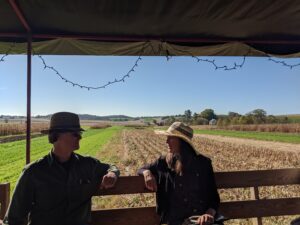
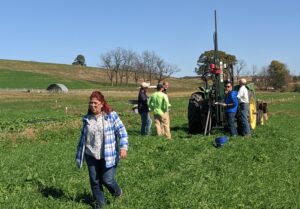
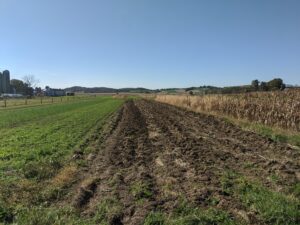
50 Agriculture Service Providers and 20 farmers will attend one of four field days taught by the project coordinator and members of the advisory committee and offered in each of the four Maryland regions; participants will gain knowledge and confidence in cover crop mulches, seed cocktails, and conservation crop rotations as a part of soil health improvement through witnessing successful adoption of the practices. These field days, open to all, will be immediately followed by a session specific to Ag Service Providers that will cover adult learning principles and practices, with a focus on “facilitating peer learning between farmers” (May – Aug. 2019)
20
50
16
83
August 31, 2019
Completed
January 31, 2019
These field days are on hold with new tentative dates in September, and a possible partnership with NRCS. However, the state coordinator was involved in several other related educational activities.
The state coordinator taught two workshops at the Delmarva Soil Summit on November 1, 2018.
"For Agricultural Service Providers: How to Create Change" focused on best practices for communicating with farmers to help them improve their operations. Topics fell under the categories of brain-based learning, story telling, and motivating continued engagement of educational programs. 12 ASPs participated.
"Soil Health Toolbox for Grain Producers" showcased four free tools for soil health and cover crop decision making and evaluation. One of these was the Soil Health Self-Evaluation tool described above. 9 ASPs and 16 farmers (25 total) participated.
The state coordinator gave a presentation summarizing his state project work at the Northeast Cover Crop Council conference on November 15, 2018 titled, "Building Soil Health Through MD Ag Service Provider Education." He highlighted the tools and techniques used and demonstrated throughout the project. 20 ASPs participated.
The state coordinator co-chaired the UMD Extension Winter Ag and Food Systems In-service training on December 13, 2018. He presented a workshop, "Motivating Adult Learners," that helped participants understand the factors that influence participants in educational programs to continue their participation and learning after the first event. 11 UMD Extension faculty participated. Slide presentation: Adult Learner Motivation (Dawson)
At a collaborative soil health meeting hosted by Future Harvest CASA on January 16, 2019, the state coordinator gave a presentation summarizing the development and function of the Soil Health Self-Evaluation Tool to a group of 31 ASPs.
On January 31, 2019, the state coordinator hosted a group of Chinese delegates employed by various agricultural agencies for an afternoon session about soil health. Topics included the basics of soil health and soil health management, the no-till revolution, local agricultural history, and the role of herbicides in soil health management. 20 Chinese delegates attended (not included in above totals).
25 UMD Extension agriculture educators will attend a 20 minute soil health session at the Maryland Association of County Ag. Agents conference to learn the importance of cover crop mulches, seed cocktails, and conservation crop rotations taught by one or more soil health experts from advisory committee (Jul. 2019)
25
July 31, 2019
Completed
June 19, 2019
The State Coordinator chaired the planning committee for the University of Maryland Ag and Food Systems In-Service Training. The cover crop topics were replaced with a session on behavioral economics (factors in language and survey design that can intentionally or unintentionally influence readers and participants). Topics by other speakers will include infographic design and farmer mental health.
Slide Presentation: Insights from Behavioral Economics
Milestone activities and participation summary
* Presented project poster at national SARE conference.
* Organized and taught a soil health presentation for a group of Chinese governmental officials.
Participation summary:
Learning Outcomes
Service providers indicated a change in knowledge, attitudes, skills, and/or awareness in two primary topic areas: soil health (e.g., no-till, cover crops, soil moisture management) and adult learning principles (e.g., story telling, brain-based teaching, motivation to learn). Data were collected with event-based surveys and an end-of-year verification survey tool.
Performance Target Outcomes
Performance Target Outcomes - Service Providers
Target #1
30 Agricultural service providers (ASPs) will incorporate new adult learning and soil health principles and practices into their educational programs and advising, reaching 500 grain and vegetable farmers representing 37,500 acres. Of these, 20 ASPs will guide 100 farmers to complete a soil health management self-evaluation tool on their fields.
37,500 acres
| Year 1 | Year 2 | Year 3 |
|---|---|---|
| 25 | 40 | 0 |
Service providers represented by the numbers above self-reported taking any of the activities below as a result of the project.
| Year 1 | Year 2 | Year 3 |
|---|---|---|
| 1083 | 1877 | 0 |
| Year 1 | Year 2 | Year 3 |
|---|---|---|
128,691 |
234,994 |
0 |
| Activity | Year 1 | Year 2 | Year 3 | Total |
|---|---|---|---|---|
| Curricula, factsheets and other educational tools | 67 | 82 | 0 | 149 |
| Consultations | 86 | 137 | 0 | 223 |
| On-farm demonstrations | 35 | 68 | 0 | 103 |
| Online trainings | 32 | 31 | 0 | 63 |
| Published press, articles, newsletters | 63 | 49 | 0 | 112 |
| Study circles / focus groups | 25 | 35 | 0 | 60 |
| Tours | 36 | 53 | 0 | 89 |
| Webinars, talks and presentations | 45 | 61 | 0 | 106 |
| Workshops and field days | 49 | 80 | 0 | 129 |
| Meetings, text, and media | 2 | 21 | 0 | 23 |
The data reported here was collected through an end of year survey distributed by email to a project mailing list with 269 ag service providers and 23 farmers, and to a UMD ag extension list with about 50 members. The first question on the survey asks respondents to check all boxes corresponding to the project events they participated in. If they check the box, “I have never participated in a Building Soil Health project event,” they are automatically sent to a “Thank you but your response is not needed” page with an opportunity to leave comments. 34 (2018) and 44 (2019) respondents completed their responses. A survey was not distributed in 2020, as the PI shifted responsibilities early in the project year. Overall numbers are high, with several respondents each reporting 20,000 to 100,000 acres affected. This is likely a reflection of a) the relatively large field and farm sizes in Maryland (especially on the Eastern Shore) compared to most other Northeastern states, and b) the high level of interest in improving soil health in Maryland.
Data on activities conducted by ASPs are in response to the question, “How many times have you incorporated information and/or used skills learned through the project (e.g., soil health and/or adult education techniques) in education programs with your clients through the following methods between October 2017 and September 2018?” Multiple choice response options were “Never,” “1-3 times,” “4-6 times,” “7-9 times,” and “10 or more times.” Numbers used for calculating totals were 0, 2, 5, 8, and 10, respectively.
Because the end of year surveys were anonymous, the totals presented here may include individuals and acres counted twice across Year 1 and Year 2.
Additional Project Outcomes
| Year 1 | Year 2 | Year 3 | Total |
|---|---|---|---|
| 2 | 2 | 3 | 7 |
“We have had great luck in cover crops for vegetables in our fields. We are turning to the tunnel to a greater degree because of concerns of moisture even with the best soils. We also will be working more with intensive grazing for the field area.”
--Farmer; Montgomery Co., MD
"I have learned that conservation practices (BMP's) used on the land in many cases far exceeds both Water Quality and Air Quality improvements when compared to Organic and conventional practices due to the fact that both Organic and conventional use significantly more tillage than conservation practices use. We are working with our farmers to gather the needed data to more accurately assess the differences in carbon footprint and carbon neutrality among the 3 farming practices."
--Non-profit staff
"Quotes from farmers I work with:
1) Since we have adopted No Till, our soils have stabilized and adsorb much more of our rainfall to the point there is nowhere we can't go with our planting and harvesting and make ruts in wet areas like we used to when with tilled our cropland.
2) Since we have adopted multi species cover crops our weed control is much better.
3) We are seeing significant yield increase with multi species cover crop on very sandy soils."
--Jack King, NRCS Conservationist, Talbot/Caroline County
"After seeing Nevin do a physical demonstration of the role of soil organic matter for erosion and water quality as part of the Healthy Soils meetings led by Lori Arguelles (around Jan. Feb. 2018), and seeing the same type of physical demos again by Sara Via, we invited Carl Koch to be a presenter at our first annual regional food system conference in Western MD in April 2019. Carl (with help from Patty Engler) also did a physical demo of soil aggregate stability, and for all the demos I see great learning impact of these physical soil demos. At our 2nd annual regional food system conference on April 3, 2020 we will again have a session on soil health."
--Dan Fiscus, Coordinator, Western Maryland Food Council, Allegany, MD
"This area is the most important thing we are doing today in agriculture. If we have a "silver bullet" in our tool box for addressing soil and water conservation it is developing the mind set of farmers about soil health and all of its great advantages."
--Verification tool respondent
Maryland has the benefit of many ASPs of all types working to promote soil health. This is undoubtedly beneficial to the state of Maryland’s soils, environment, residents, and farmers. The fact that so many people are doing so much good work sometimes creates a crowded marketplace of educational opportunities when it comes to competing for a slice of the farmer’s precious time, but it more often leads to strong partnerships and a whole that is greater than the sum of its parts. In the context of this project, many planned activities were merged with the work of other leaders and organizations in the field, and partnerships were the primary theme of 2018’s work. Alice Ferguson Foundation, Town Creek Foundation, ShoreRivers, USDA Agricultural Research Service, Maryland Department of Agriculture, Maryland NRCS, and Future Harvest CASA were all instrumental in further promoting the research, practices, policies, and programs that advance the profitability of the farmer while minimizing their impact on the environment, and in some cases, like carbon farming, mitigating the effects of other sectors.
SARE Outreach
11/1/17: spoke about Northeast SARE grants at field day
11/7/17: Northeast SARE grant display at Northeast Cover Crops Council conference
3/9/18: Northeast SARE grant display at Delmarva Organic Ag conference
6/18/18: Presented webinar on Northeast SARE grants with a focus on large grant programs
1/18/19: Staffed Northeast SARE exhibit at the Future Harvest CASA conference in College Park, MD
3/7/19: Spoke about Northeast SARE grant programs at the UMD Extension Organic Agriculture Roundtable in Chestertown, MD
5/2/19: Spoke about Northeast SARE grant programs at the Maryland Eastern Shore UMD Extension ag educator meeting
6/17/19: Spoke about Northeast SARE grant programs at the CROWN project cover crop workshop
6/19/19: Spoke about Northeast SARE grant programs at the UMD Extension ag educator In-Service Training
9/25/19: Spoke about Northeast SARE grant programs at the Healthy Soils Consortium meeting
1/17/20: Staffed Northeast SARE exhibit at the Future Harvest conference
1/17/20: Spoke about SARE grant programs at the Future Harvest conference
2/26/20: Staffed Northeast SARE exhibit at the Future Harvest conference
2/26/20: Spoke about SARE grant programs at the Future Harvest conference
Ongoing: individual discussions with many farmers and service providers in response to emails, phone calls, and conversations about SARE grants
Ongoing: service on the National SARE Outreach Steering Committee to provide guidance in the selection of projects in which to invest SARE Outreach staff time, contract fees, and publication expenses.